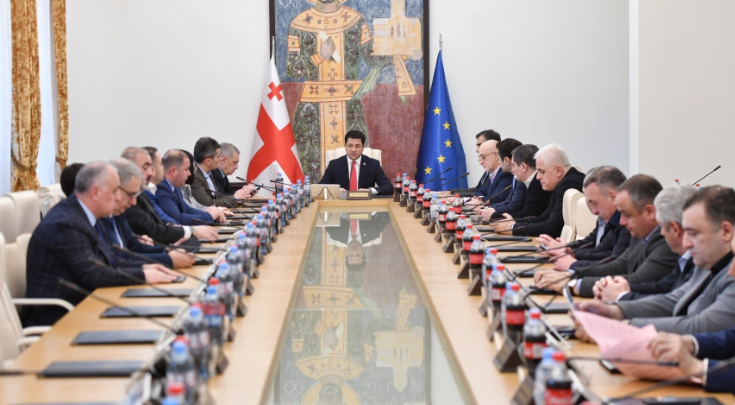
Georgian Dream Introduces Electoral Reform Bill to Parliament
Following the March 8 Agreement on changing the electoral system ahead of 2020 parliamentary election, the ruling Georgian Dream party brought forward a bill envisaging to amend the Constitution.
The bill registered on March 11 reads that 2020 parliamentary polls will be held based on what is referred to as the 120/30 system, which means that 120 MPs will be elected through proportional party lists and 30 – from single-mandate constituencies (also known as the majoritarian voting system).
Besides, as a one-off measure, the electoral threshold for the proportional elections will be fixed at 1% of the votes (currently it stands at 5%). As for the electoral blocs (coalitions), the threshold for them (in percentage points) will be equal to the number of political parties coalesced in the entity. According to the bill, if a political party/coalition of parties garners less than 40.54% of all votes, it will not be able to form the government.
The bill suggests to draw 30 single-mandate constituencies, eight of which will be formed in the capital Tbilisi and the rest 22 will be drawn the regions.
Tbilisi will be divided into eight voting districts: Mtatsminda and Krtsanisi district; Vake; Saburtalo; Isani; Samgori; Didube and Chughureti; Gldani; and Nadzaladevi.
As for the regions, the following municipalities will form twenty-two single-mandate constituencies:
- Telavi, Akhmeta, Kvareli and Lagodekhi municipalities;
- Gurjaani, Sagarejo, Dedoplitskaro and Signagi municipalities;
- Rustavi municipality and Norio, Martkopi, Akhalsopeli, Sartichala, Gamarjveba, Akhali Samgori, Lemshveniera, Teleti, Kumisi and Krtsanisi administrative units in Gardabani municipality;
- Marneuli and Gardabani (excluding aforementioned adm. units) municipalities;
- Bolnisi, Dmanisi, Tetritskaro and Tsalka municipalities;
- Mtskheta, Dusheti, Tianeti and Kazbegi municipalities;
- Kaspi and Gori (excluding Variani, Nikozi, Tirdznisi, Skra and Shindisi adm. units) municipalities;
- Khashuri and Kareli municipalities and Variani, Nikozi, Tirdznisi, Skra and Shindisi adm. units of Gori excluding municipality;
- Akhaltsikhe, Borjomi, Adigeni and Aspindza municipalities;
- Akhalkalaki and Ninotsminda municipalities;
- Kutaisi municipality;
- Sachkhere, Chiatura and Kharagauli municipalities;
- Tkibuli, Terjola, Zestaponi and Bagdati municipalities;
- Samtredia, Tskaltubo, Vani and Khoni municipalities;
- Zugdidi municipality;
- Poti, Khobi and Senaki municipalities;
- Tsalenjikha, Chkhorotsku, Martvili and Abasha municipalities;
- Ozurgeti, Lanchkhuti and Chokhatauri municipalities;
- Batumi municipality;
- Kobuleti municipality and Makhinjauri, Ortabatumi, Akhalsheni and Peria adm. units of Khelvachauri municipality;
- Khelvachauri (excluding aforementioned adm. units), Keda, Shuakhevi and Khulo municipalities;
- Ambrolauri, Oni, Tsageri, Lentekhi and Mestia municipalities.
The bill stipulates that any snap elections until the projected 2024 polls must be held according to the said system.
On March 11, during the closed session of the Parliamentary Bureau, Parliament Speaker Archil Talakvadze hailed the March 8 agreement as a “positive step” in the further enhancing democracy.
On March 8, representatives of the ruling and opposition parties finally reached a consensus on changing the electoral system during a round of negotiations held at U.S. Ambassador’s residence. The agreement was unanimously endorsed by international observers and Georgia’s partner countries.
Prior to reaching the deal, Georgian Dream and opposition representatives held several rounds of negotiations, though to little or no avail. The talks were kicked off after Georgian Dream deputies had voted down constitutional amendments enabling change to fully proportional elections on November 14.
On February 10, after Supreme Court’s decision to send to jail European Georgia party leader Gigi Ugulava, the opposition quit the negotiations. The talks resumed in late February owing to the mediation by foreign diplomats.
Georgian Dream, Opposition Reach Consensus over Electoral Reform
This post is also available in: ქართული Русский